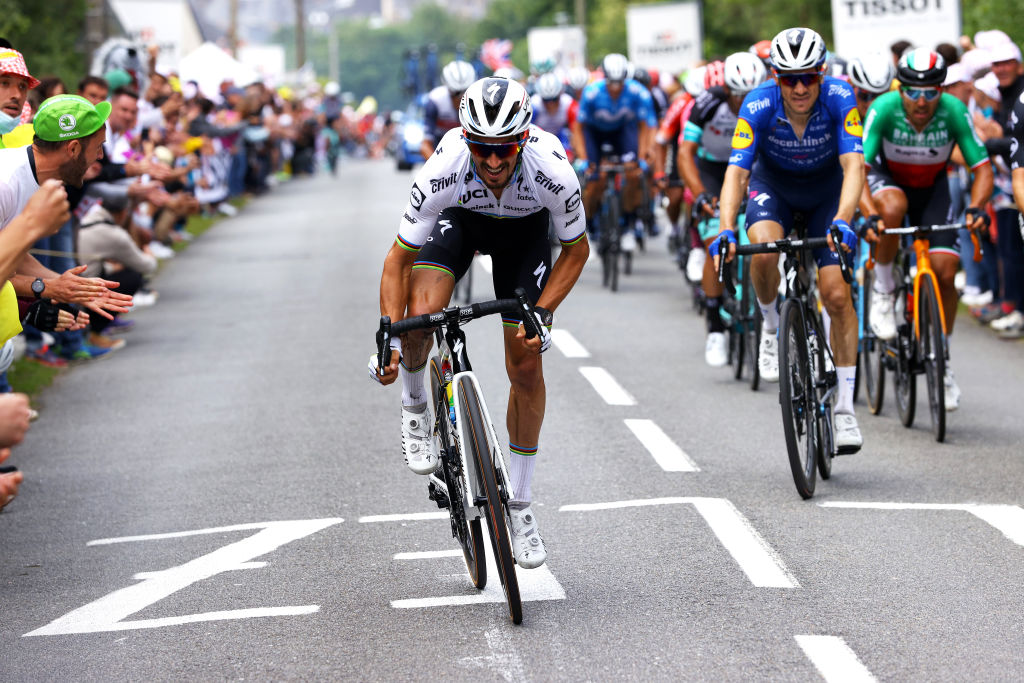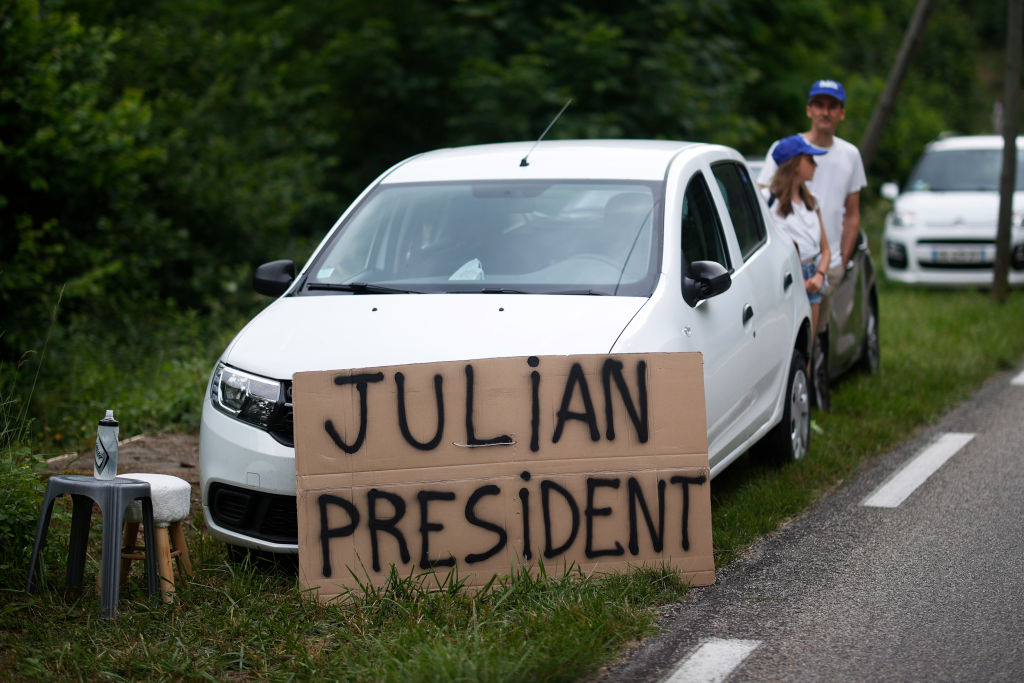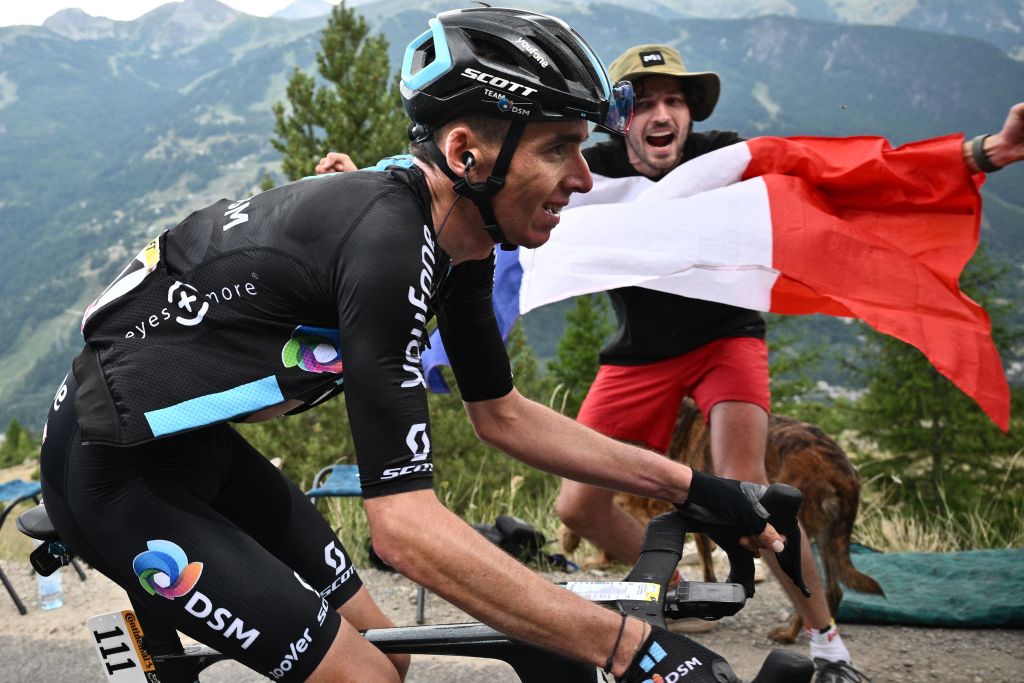With no French win after 16 stages, does the Tour de France miss Julian Alaphilippe?
The race has missed the dynamic Frenchman as much as he has missed it


The latest race content, interviews, features, reviews and expert buying guides, direct to your inbox!
You are now subscribed
Your newsletter sign-up was successful
The run-up to the Tour de France saw a lot of speculation over the inclusion - or lack of - Mark Cavendish in Quick-Step Alpha Vinyl's squad, especially in the British press. His absence, at the benefit of Fabio Jakobsen, meant he was unable to have a go at winning another stage and holding the record for wins outright. A tragedy for some.
However, in all the fuss over Cavendish's absence, another loss to the Tour, also from Quick-Step, was a little obfuscated. Julian Alaphilippe, the two-time world champion, the man who has won stages at the last four Tour de France, and worn the yellow jersey at the three most recent, was forced to stay at home.
There have been five French winners at the Tour in the last five editions, across nine stages. Five of those occasions have seen Alaphilippe cross the line first.
Tuesday marked three years since his win in the individual time trial in Pau in the maillot jaune, a moment that made people believe that it could be time for a French winner of the Tour. This victory, under extreme pressure, is the kind of thing that has been lacking this year.
"I have a natural affection for the race, from my days in the yellow jersey over the past three seasons, my stage victories and many other great memories with my teammates," he said in a statement before the race.
"To miss another opportunity to wear my beautiful rainbow jersey in my home country is very sad for me and I knew that this decision would be difficult for the team to take," Alaphilippe continued. "At the same time, I completely understand this, because I too don’t want to be at the start if I can’t be at my best level.
The absence of the Frenchman at this year's race has been hugely damaging to the race, not just for French fans, who have had little to cheer for, but also for the race. Wout van Aert (Jumbo-Visma) has done a decent dynamic impression, but it is not quite the same as Alaphilippe.
The latest race content, interviews, features, reviews and expert buying guides, direct to your inbox!
"For French cycling, he is missing," AG2R Citroën's team boss, Vincent Lavenu, explained. "He is a spectacular, charismatic rider. Of course he is missing."
Alaphilippe's teammate, and reigning French national champion, Florian Sénéchal, agreed.
"When you take the first week, Planche des Belle Filles, Longwy, Lausanne, these are typical finishes for Julian," he told Cycling Weekly. "Also Mende was good for Julian. For sure we miss him, but he did not have a good feeling before the Tour de France, and you need to be in your top shape for the Tour."
The world champion was involved in a horror crash at Liège-Bastogne-Liège earlier this year, which has left him out of almost all racing since then. While there was hope he could recover in time for the biggest race of them all, it did not happen.
Quick-Step started the race well, winning the first two stages through Yves Lampaert and then Fabio Jakobsen, but since then have been strangely absent from the action, suffering from missing Alaphilippe as much as everyone else, possibly.

France has also struggled at this year's race. The country has achieved just five podium finishes on individual stages across this year's edition, with Valentin Madouas (Groupama-FDJ) finishing second on stage 16, and through Christophe Laporte (Jumbo-Visma), David Gaudu (Groupama-FDJ), Romain Bardet (Team DSM) and Thibaut Pinot (Groupama-FDJ); these were all third places.
They might have two riders in the top ten on general classification - Bardet and Gaudu - but this pair seem off the pace of Jonas Vingegaard (Jumbo-Visma) and Tadej Pogačar (UAE Team Emirates). Without Alaphilippe, they look a bit lost.
"It's possible, because French riders in the last years have proved it can be possible, but today the game is a little bit different," Lavenu said. "There are some foreign riders at the top, Pogačar, Vingegaard, so it makes it more difficult."
This is why the absence of Alaphilippe hits harder.
"For the French, Julian has become the most popular French rider by far, even more than Pinot and Bardet," veteran French journalist François Thomazeau explained. "In a way, we were lucky that the first week was in Denmark and partly Switzerland. The fans were not many, but I'm sure for him he was really heartbroken to not be here."
There is no guarantee, of course, that Alaphilippe would have done anything spectacular at this year's race, but he would have surely tried something, livened up a few stages. Van Aert and Pogačar dominated the opening week, but Alaphilippe could have added been a third musketeer, it would have suited his look, too.
"Thibaut Pinot has been on the attack, even if he didn't win the stage. Romain Bardet is currently up there overall, and you never know what can happen but he looks very consistent, so the podium is within reach," Thomazeau continued. "In that dynamic, Julian Alaphilippe would have been at his best, especially in the first week of the race. That was perfect for him. But, as we know and we've seen in the classics, you've got Alaphilippe, [Mathieu] Van der Poel and Van Aert.
"It was not Van der Poel's year, but I'm afraid Julian might have struggled to beat Van Aert, on the basis of his strengths at the moment. We will see next year, maybe Van Aert will be less dominant, and Van der Poel and Alaphilippe can challenge. It will be very exciting."

Bastille Day, or Quatorze juillet, has come and gone, and still France waits for a stage winner, expectantly. Despite this, the Tour is still a big draw everywhere it goes - anyone who has been to a stage start or up any climb can attest to that.
"For me, every day is 14 July, because all the French people are so crazy when they see me on the road with this jersey on," Sénéchal, the French champion said, on 14 July. "I hope the next days are the same, all the way to Paris. It's unbelievable to bring this jersey to the Champs-Élysées.
"It's a crazy day for me because I never know this jersey means so much to the French people. Every day on the road I am a superstar. It's crazy, I hope I can have the jersey for the next years of my career."
There is a cliché that "the Tour is the Tour", but it really is, on a different level to anything else. In this environment, perhaps it doesn't immediately matter that there has not been a French winner so far. There are, of course, five stages for this to be rectified.
"The Tour de France is the Tour de France," Thomazeau said. "As you see every morning, for the kids, for the parents, it's always a matter of being a part of the big July festival. Often the publicity caravan is more important to them than the riders. I've been a French kid waiting for riders on the side of the road, and you were really fighting hard to get bits of paper and the stuff they were throwing out.
Also, the publicity caravan is half an hour sometimes, it's a moving festival. Whereas the riders fly past in ten seconds. It's impressive, and at the same time you just miss the guy you want to see. I'm sure if the Tour was going around without the peloton it would be popular still. It has been part of French life for 119 years now, so it belongs to our culture and to who we are."
Vive La France, vive Le Tour, but come back next year Julian.

Adam is Cycling Weekly’s news editor – his greatest love is road racing but as long as he is cycling, he's happy. Before joining CW in 2021 he spent two years writing for Procycling. He's usually out and about on the roads of Bristol and its surrounds.
Before cycling took over his professional life, he covered ecclesiastical matters at the world’s largest Anglican newspaper and politics at Business Insider. Don't ask how that is related to riding bikes.